七年级英语下册Unit2Neighbours词汇与语法基础训练(新版)牛津版
七年级英语下册 Unit 2 Neighbours知识点精讲(下)(新版)牛津版

U2基础知识梳理(下)一、词汇Words1. fix 安装,使固定fix 用作及物动词,表示“安装,使固定”之意,其后直接跟名词、代词作宾语。
(1)fix 用作“安装”,指安装门窗,电灯,机器等。
例:他正在房间里安灯。
(2)fix 用作“使固定”,指把某物固定在另一物体上。
例:我们要把图画贴在墙上。
(3)fix 也可以表示“修理”之意,与repair 可互换。
例:我可以为你修理苹果手机。
2. job 工作job,可数名词,意为某一具体的“工作”,复数形式是 .work不可数名词名词,意为职位之内具体的工作例:他能在城市里能找到一份工作。
问职业:1) ----What are you________?--- I am a woman doctor.A. doingB. jobC. workingD. \2) I don’t like my_______. Because I have a lot of ______ to do.A. work; workB. job; jobC. job; workD. work; job3) One of the _________ there ______ my mother.A, woman doctors; is B. woman doctors; are C. women doctors; is D. women doctors; are(1)below,用作介词,表示位置、数字、职业等“在…下面”之意例:这位年轻人不到20岁。
(2) below 用作副词,表示“在下,向下”之意。
例:瞧!迈克正站在下面。
4. fire n. 火fire用作不可数名词,意为“火”,常用“”着火了;set something on fire“引火烧某物”;“着火了”等固定搭配。
例1 当我们到那时,房子着火了。
例2 我们想知道是谁引火烧了这辆车。
批注:fire也可用作可数名词,意为“火灾,燃料”,意为“生火”5.policeman n.警察postman n.邮递员(男) post woman(女)policeman 男警察 policewoman 女警察复数形式例:这个生病的人需要我们的帮助。
七年级英语下册 Unit 2 Neighbours词汇语法素材 (新版)牛津版
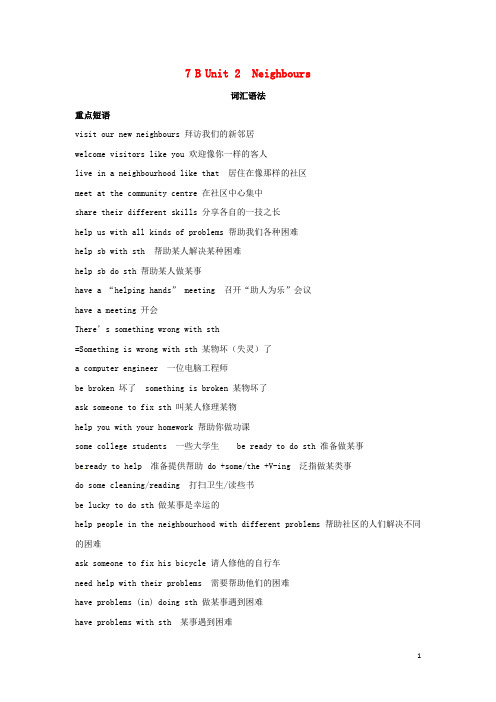
7 B Unit 2 Neighbours词汇语法重点短语visit our new neighbours 拜访我们的新邻居welcome visitors like you 欢迎像你一样的客人live in a neighbourhood like that 居住在像那样的社区meet at the community centre 在社区中心集中share their different skills 分享各自的一技之长help us with all kinds of problems 帮助我们各种困难help sb with sth 帮助某人解决某种困难help sb do sth 帮助某人做某事have a “helping hands” meeting 召开“助人为乐”会议have a meeting 开会There’s something wrong with sth=Something is wrong with sth 某物坏(失灵)了a computer engineer 一位电脑工程师be broken 坏了 something is broken 某物坏了ask someone to fix sth 叫某人修理某物help you with your homework 帮助你做功课some college students 一些大学生 be ready to do sth 准备做某事be ready to help 准备提供帮助 do +some/the +V-ing 泛指做某类事do some cleaning/reading 打扫卫生/读些书be lucky to do sth 做某事是幸运的help people in the neighbourhood with different problems 帮助社区的人们解决不同的困难ask someone to fix his bicycle 请人修他的自行车need help with their problems 需要帮助他们的困难have problems (in) doing sth 做某事遇到困难have problems with sth 某事遇到困难check their computers 检修他们的电脑find someone to fix things like broken bicycles 找人修理像坏自行车之类的东西be like a big family 像个大家庭take an umbrella with sb 随身携带一把雨伞wait for us to call back 等我们回电 wait for your call 等你的电话be free 自由的、空闲的 be going to be late 将要迟到了be (so) cloudy 多云 plan a day out 计划外出一天the day after tomorrow 后天 bring some water 带些水make a fire生火cook some food煮食物an office worker 办公室人员 in a police station 在警察所in a post office 在邮局 in the town centre 在镇中心Wendy’s elder brother/sister文迪的哥哥/姐姐be busy with sth 忙于某事be busy doing sth 忙于做某事 work for a company 效力于一家公司far away from her home 远离她的家 in the future 将来be a computer engineer 做一名电脑工程师sound like a good idea 听起来像是好主意help sick people 帮助病人 be an artist 做一位艺术家in an hour 一小时后 turn on / off 开/关(电器按钮等)go in 进去;进入 go in for 参加,从事next team 下学期 keep busy 保持忙碌cold drink 冷饮料 on the afternoon of 5 March 在3月5日下午look at the information below 看下列信息 feel well 感觉身体好make you feel better 使你感觉更好worry about sth / (not)doing sth 担心某物/担心(不)做某事all our group members 我们所有的团体成员give you some ideas 给你一些建议what to wear to a party 穿什么去参加晚会how to design their home 怎样设计他们的家园重点句型1. What are your neighbours like?= How are you neighbours?你的邻居们(性格品质)如何?What be sb/sth like?你认为…怎么样(性格品质)?(用形容词回答)What do/does sb. like?某人喜欢什么?What do/does sb. look like?某人长什么样子(外貌)?2. Are you not feeling well these days? 你最近觉得不舒服吗?I’m not feeling well.= I don’t feel well. “well”此处是形容词,表示身体好的。
七年级英语下册Unit2Neighbours词汇提优训练(新版)牛津版

Unit 2 Neighbours词汇提优训练I. 根据汉语提示、句意或英文释义写出单词1. If you want to know some ________ (信息) about the new film, you can call us.2. Pieces of ________ (破碎的) glass fell down from the old building yesterday.3. Qi Baishi is one of the most famous a________ in China.4. I was l________ enough to catch the last bus before it left.5. Can you help me ________ my radio? It doesn’t work. —Sorry, I can’t. But we can ask my dad for help.6. Don’t worry about ________ (have) too much homework. It’s easy.7. — ________ your father (play) basketball with you this Sunday morning? —No, he isn’t. He will go shopping with us.8. Some doctors and nurses ________ (visit) the old people tomorrow.9. The sky is so dark. I think it ________ (rain).10. Look! The students are making cards ________ (show) love to their mothers.11. The wonderful car is one of the ________ (经理) of a toy company.12. Can you see the two ________ (人) in our classroom? They are Jim’s parents.13. Tony’s father and uncle are both ________ (警察). They help keep the city safe.14. His father runs two big ________ (公司), so he is very busy.15. —Where will you go to study after you graduate(毕业) here? —I want to study in America in the f________ .16. —What does your father do, Liu Yang? —He’s a p________ in a post office.17. Her ________ (the older of two people) brother goes to school by bike every day.18. Maria can’t come today because she’s ________ (be ill).19. —Can you see those ________ (通知) on the noticeboard? —Yes. But I don’t know what they say.20. Read this story and then answer the questions ________ (在.....下面).21. He wants to know some ________ (信息) about the old man from America.22. His home is very beautiful, because he knows how to d________ his home.23. —Who’s the woman in a hat? —She’s my ________ . She lives next to my house.24. —Are you doing your homework, Tom? —Yes, Mum. Don’t ________ about me. I can do it well.25. The students are discussing what ________ (paint) on the wall.26. He will be happy ________ (help) you solve the problems.27. My grandmother always ________ ( worry) about her health.28. There ________ ( be) a party tomorrow evening. Would you like to go with me?29. Who is the ________ (one) to get to school?30. —Who ________ (sing) at the party tomorrow? —Miss Wang is.31. The children ________ (have) a picnic this weekend. They are getting ready for it.32. Follow me, please, or you ________ (lose) your way.33. — ________ Millie ________ (go) shopping with you? —No, she won’t.34. There ________ (be) a meeting this weekend. Do you know, Tina?35. — ________ he ________ (play) basketball the day after tomorrow? —Yes, he is. He is a member of our school basketball team.36. Don’t worry. The bus ________ (come) soon.37. The children ________ (visit) the park tomorrow, aren’t they?38. — ________ we ________ (go) to the park this afternoon? —Good idea.39. How long ________ (take) to get there by bus tomorrow?40. Isn’t she ________ (幸运的)? She can eat what she wants and she never gets fat.41. We should learn as many different ________ (技能) as we can.42. ________ (工程师) work is important and hard.43. Now many students want to be ________ (志愿者), because they want to help more people in need.44. My mother ________ (检查) my homework every night.45. His cousin wants to go to c________ after he finishes high school.46. —What do you think of Lily? —She is kind and h________ . She often helps me with my study.47. Tom worked out the difficult maths p________ finally.48. Lucy’s watch doesn’t work. She wants to ask someone to ________ it.49. —Is there ________ in your classroom now? —Nobody.50. —Why not do some ________ (clean) with me now? —Good idea.51. —How often do you have a class ________ (meet)? —Every Monday afternoon.52. My bike is ________ (break). I can’t go home without it.53. On Sundays I often go to the ________ (help) Hands Club.54. There isn’t ________ (something) wrong with this bike. You can buy it.55. We should help our ________ (邻居) when they’re in trouble.56. —What is wrong with the boss? —He is shouting at the ________ (服务员). Maybe they have made some mistakes.57. About 200,000 ________ (游客) came to Tai’erzhuang Ancient Town during May Day. It’s difficult to believe.58. —Neil, we all welcome the students l________ you. —Thank you very much.59. Don’t be a________ to change something in your life. You might like it.60. It is comfortable ________ (live) in a clean and beautiful town.61. —Where are you going, Tom? —I’m ________ (go) to Sunshine Restaurant.62. Now tall ________ (build) can be seen everywhere in Beijing.63. —Where is your new flat, Nick? —It’s in ________ (nine) Street.64. ________ (many) of the students here , come to school on foot. Only a few come by bus or by car. Ⅱ. 用方框中所给词语的正确形式填空1. He ________ playing table tennis. You can learn from him.2. —I’m going to be a policeman in the future. —That ________ great.3. You draw very well. You can be an ________ .4. I ________ of passing the exam. How about you?5. It takes ________ a whole day to finish the work.6. His home is not near the school, so he has to go to school ________ .B1. It’s seven o’clock. My mother ________ in the kitchen.2. Those kind people are always ready ________ something for the people in need.3. Don’t ask Tom ________ swimming wit h you. He is doing his homework.4. It’s comfortable ________ a rest if you are tired.5. Why not ________ someone to fix it?I. 根据汉语提示、句意或英文释义写出单词1. information2. broken3. artists4. lucky5. fix6. having7. Is; going to play8. are going to visit/will visit9. is going to rain10. to show11. managers’12. persons 13. policemen 14. companies 15. future16. postman 17. elderly 18. sick 19. notices 20. below21. information 22. design 23. neighbour 24. worry 25. to paint26. to help 27. worries 28. will be/is going to be 29. first 30. is going to sing31. will/are going to have 32. will lose 33. Will; go 34. will/is going to be 35. Is; going to play36. is coming 37. are going to visit 38. Shall; go 39. will; take 40. lucky41. skills 42. Engineers’ 43. volunteers 44. checks 45. college46. helpful 47. problem 48. fix 49. anyone 50. cleaning51. meeting 52. broken 53. Helping 54. anything 55. neighbours56. waiters 57. visitors/ tourists 58. like 59. afraid 60. to live61. going 62. buildings 63. Ninth 64. MostⅡ. 用方框中所给词语的正确形式填空A1. is good at2. sounds3. artist4. am sure5. more or less6. by busB1. is cooking2. to do3. to go4. to have5. find。
牛津译林英语七年级英语下册unit2neighbours知识点归纳 (2).docx
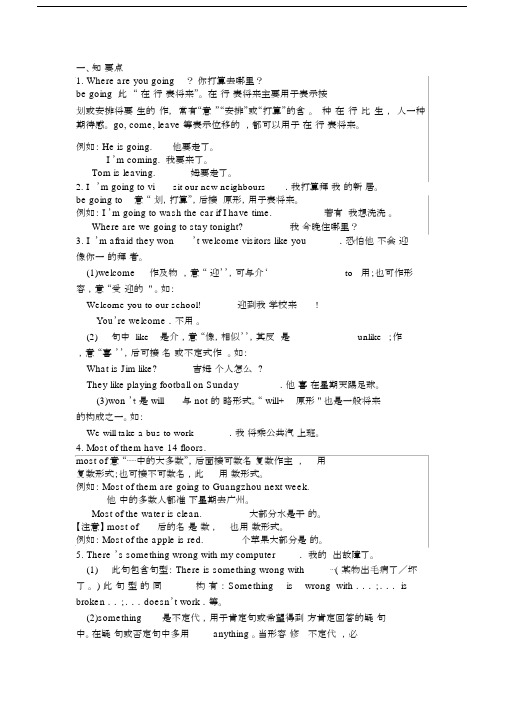
一、知要点1. Where are you going?你打算去哪里?be going 此“ 在行表将来”。
在行表将来主要用于表示按划或安排将要生的作,常有“意”“安排”或“打算”的含。
种在行比生,人一种期待感。
go, come, leave 等表示位移的,都可以用于在行表将来。
例如: He is going.他要走了。
I ’m coming. 我要来了。
Tom is leaving.姆要走了。
2. I’m going to vi sit our new neighbours.我打算拜我的新居。
be going to意“ 划,打算”,后接原形,用于表将来。
例如: I ’m going to wash the car if I have time.若有我想洗洗。
Where are we going to stay tonight?我今晚住哪里?3. I ’m afraid they won’t welcome visitors like you.恐怕他不会迎像你一的拜者。
(1)welcome作及物,意“ 迎’’,可与介‘to用;也可作形容,意“受迎的 " 。
如:Welcome you to our school!迎到我学校来!You’re welcome .不用。
(2)句中like是介,意“像,相似’’,其反是unlike;作,意“喜’’,后可接名或不定式作。
如:What is Jim like?吉姆个人怎么?They like playing football on Sunday.他喜在星期天踢足球。
(3)won ’t是 will与not的略形式。
“ will+原形"也是一般将来的构成之一。
如:We will take a bus to work.我将乘公共汽上班。
4. Most of them have 14 floors.most of 意“⋯⋯中的大多数”,后面接可数名复数作主,用复数形式;也可接不可数名,此用数形式。
Unit2Neighbours知识讲义牛津译林版英语七年级下册

牛津版译林英语7B知识点总结Unit2 Neighbours1.Where are you going?【知识点一】:be doing(1)现在进行时表将来(2) go、e、leave、move表示移动的词,都可以用“现在进行时表将来”(3)进行时开始表示:近期一直在做某事2. I'm afraid they won't wele visitors like you. 恐怕他们不会欢迎像你这样的客人。
(P18)【知识点一】afraid adj. 害怕的(1) I'm afraid (that) + 宾语从句, 恐怕Eg. I’m afraid (that) you are wrong.(2) be afraid of doing sth 害怕做某事= be afraid to do sth(3) I'm afraid not. 恐怕不是这样的。
Eg.—Can you get there before 6 o’clock? —I’m afraid not.(4) I'm afraid so. 恐怕是这样的。
Eg.—Is it going to rain tomorrow? —I’m afraid so.【随堂练习】1. —Will your father e to see your piano show tomorrow?— . He is having an important meeting in Beijing now.A. They'd like toB. You're rightC. I'm afraid soD. I'm afraid not2. —Would you like to help me with my lessons?—Sorry. .I have no time now .A. I'm sure.B. I'm afraid.C. I'd like.D. I hope.【知识点二】visitor (n.)拜访者①visit v. 参观;拜访n. 参观visit sp. = be on a visit to sp.②构词法:动词+or→表示人的职业或身份act→ actor invent→ inventor collect→ collector【随堂练习】1. Do you know the (visit) telephone numbers? I want to call them.【知识点三】like(1) v. 喜欢like doing sth./ like to do sth. 反义词:dislike = hate(2) prep. 像反义词:unlikebe like/look like①问性格,品质What be sb. like?Eg.—What is he like? —He is kind and helpful.②问外貌:What does sb. look like? = How does sb. look?Eg.—What does he look like? = How does he look?—He looks tall and strong.区别:What does sb like (doing)? 问爱好(3)不能单独作谓语: be like 像…look like 看起来像… sound like听起来像【随堂练习】1.The boy, his father, playing football.A. like;likesB. likes;likeC. liked;likeD. like; will like2.— __________ your hometown like? —It’s a good place ___________.A. How is; to liveB. How does; to liveC. What is; livingD. What is; to live3. What is your father like?A. He likes history best.B. He likes eating meat.B. He is kind and friendly. D. He is forty years old.补: 问职业①What be sb? ②What be sb’s job? ③What do/does sb do?3. How many buildings are there in your neighbours? 在你居民区有多少幢楼?【知识点一】how often, how many times, how soon, how long 与how far的区别【随堂练习】1. — ______ do you help your parents do housework? — Every evening.A. How oftenB. How longC. How soonD. How far2. — ______ music do you listen to every day? —One hour.A. How manyB. How longC. How soonD. How much3. — ______ hours of music do you listen to every day? —One.A. How manyB. How longC. How soonD. How much4. — ______ will you e back? —In two days.A. How oftenB. How longC. How soonD. What time4. Most of them have 14 floors. 它们大多数有14层。
江苏省如皋市石庄初中七年级英语下册《Unit 2 Neighbours》 重点短语和句型素材 牛津版

11. visit our new neighbours2. be afraid3. most/some of them4. around yo ur neighbourhood5. be kind and helpful6. at the community centre7. share their different skills8. help(v) you with your homework help the old people clean their flats9. get help(n) with their homework 10. need help(n) with their problems 11. a computer engineer 12. an engineer/an artist/an office worker 13. be broken 14. fix the broken bicycle 15. some college students 16. be ready to help 17. do some shopping/cleani ng/reading 18. find someone to do sth 19. take an umbrella with me 20. wait for us to call back 21. plan a day out 22. br ing some water 23. in the town centre = in the centre of town 24. her elder brother/sister 25. go t o work by train 26. work for a company 27. a company far (away) from her home 28. in the future 29. sound like a good idea 30. help sick people (sick 作定语) 31. be sick/ill (ill 和sick 作表语) 32. feel well(adj) 33. the fifth of March=March the fifth 34. the information below 35. make you feel better 36. know a lot about styles learn much 37. be happy to do sth 38. Where are you going ? 39. I ’m afraid they won ’t welcome visitors like you. 40. Where do you live? 41. It ’s good to live in a ne ighbourhood like that. 拜访我们的新邻居恐怕他们中的大多数/一些在你的街区周围友好且乐于助人在社区中心分享他们不同的技能帮助你解决作业方面的困难 帮助老人打扫他们的公寓在他们的作业方面得到帮助在他们的问题方面需要帮助一个电脑工程师一名工程师/艺术家/办公室职员损坏了的修理损坏的自行车一些大学生乐意帮忙买东西/ 打扫卫生/读些书找到某人做某事我随身带上一把伞等我们回电话计划一天外出带来一些水在镇中心她的哥哥/姐姐乘火车去工作为一家公司工作一个远离她家的公司在将来听起来像个好主意帮助病人不舒服/恶心感觉好(身体好)三月五号下面的信息使你感觉更好关于风格了解许多开心地做某事你要去哪里(come, go 的进行时表示将来)我恐怕他们不会欢迎像你这样的拜访者你住哪里 (live 后无介词,因为where 是疑问副词) 住在像那样的街区是好的对你来说住在像那样的街区是幸运的对某人来说,做某事是...的你的邻居们怎么样?某人怎么样?/某人长什么样?(用于询42. You are lucky to live in a neighbo urhood like that=It’s lucky for you to live in a neighbourhood like that43. It’s + adj + (for sb) +to do sth44. What’s your neighbours like?What be +主语+like?45. There’s something wrong with my computer.=My computer is broken.=Something is wrong with my computer.46. My parents and I are planning a day out w ith my uncle’sfamily the day after tomorrow.47. What are you going to be in the future?48. Are you feeling well these days?49. What is your father ?=What is your father’s job?=What does your father do?2。
牛津译林英语七年级英语下册unit2neighbours知识点归纳

一、知识要点1.Where are you going?你打算去哪里?be going此处为“现在进行时表将来”。
现在进行时表将来主要用于表示按计划或安排将要发生的动作,常有“意图”“安排”或“打算”的含义。
这种现在进行时比较生动,给人一种期待感。
go, come, leave等表示位移的动词,都可以用于现在进行时表将来。
例如:He is going. 他要走了。
I’m coming. 我要来了。
Tom is leaving. 汤姆要走了。
2. I’m going to vi sit our new neighbours.我打算拜访我们的新邻居。
be going to意为“计划,打算”,后接动词原形,用于表将来。
例如:I’m going to wash the car if I have time. 若有时间我想洗洗车。
Where are we going to stay tonight? 我们今晚住哪里?3. I’m afraid they won’t welcome visitors like you.恐怕他们不会欢迎像你一样的拜访者。
(1)welcome作及物动词,意为“欢迎’’,可与介‘词to连用;也可作形容词,意为“受欢迎的"。
如:Welcome you to our school! 欢迎到我们学校来!You’re welcome.不用谢。
(2)句中like是介词,意为“像,相似’’,其反义词是unlike;作动词时,意为“喜欢’’,后可接动名词或不定式作宾语。
如:What is Jim like? 吉姆这个人怎么样?They like playing football on Sunday.他们喜欢在星期天踢足球。
(3)won’t是will与not的缩略形式。
“will+动词原形"也是一般将来时的构成之一。
如:We will take a bus to work.我们将乘公共汽车上班。
七年级英语下册 Unit 2 Neighbours词形专练(新版)牛津版

七下U21, My mother______(担心) about my sister.2, She is______(幸运的) enough to win the big prize.3, I can see some______(信息) in today’s newspaper.4, My______(邻居) are all friendly to me.5, Most______(postman) are good at riding bikes.6, I’m happy because your idea______(sound) very good.7, Look, there is a new______(通知) over there.8, People can form a ______(组,群) of four to joining the activity.9, Can you ______(修理) Simon’s mobile phone? It doesn’t work.10, The doctors and nurses in the hospital are polite and h______. We all like them.11, ---Who______(speak) at the meeting tomorrow? ---Maybe Mr. Li is.12, Mary lives six floors______(下面) Wendy. She lives on the fourth floor.13, I’m going to be a doctor to help______(生病的) people.14, He can speak English______(good) than I.15, Each member at the Art and Design Group______(know) a lot about that.16, My computer______(not work). Maybe there is something wrong with it.17, How many ______(visit) come to Nanjing every year?18, The______(经理) won’t have a meeting this afternoon.19, My sister likes drawing, so she is going to be an______ when she grows up.20, My dream is to be a teacher in the______(将来).21, ______(任何人) can have a rest in the room, no matter men or women, the old or the young. 22, She works in a factory. It’s 5 kilometers______(在…之外) from her home.23, ----It’s so sunny. I don’t think it______(rain). ---Maybe you’re right.24, ---______you ______(arrive) at the airport soon? ---Yes, of course.25, There______(be) a volleyball match in our playground this afternoon.26, I am planning a day______(外出) with my uncle’s family next week.27, The social workers teach us new______(技能) and share their knowledge with us.28, ---Does the next bus leave at 8:45? ---I’m not sure. Let me______(核实,检查) it for you. 29, My daughter studies at a medical______(学院).30, They’re sending an______(工程师) to fix the machine.31, He always______(stay) at home and watches TV on rainy days.32, Jane is always the first______(get) to the classroom every day.33, Will you do some______(购物) with me this weekend?34, Some______(志愿者) in our school are ready to help people in need.35, Don’t touch the______(break) glass. It may hurt your hand.36, I’m afraid they______(not welcome) you to the party.37, Can you find anyone______(help) you with your homework?38, Wow, how tall the new______(build) are!39, ---What’s your j______?---I work in school.40, If you don’t know what______(wear) to a party, the ______ (design) here will help you.感谢您的支持,我们会努力把内容做得更好!。
牛津译林版七年级英语下册Unit2 Neighbours词法句法过关练(含解析)

Unit 2 Neighbours (词法句法过关练)一、单项选择1.The volunteers ________ us ________ all kinds of problems tomorrow afternoon.A.will help; with B.help; to do C.will help; to do D.help; with2.—How about going to the cinema tonight— ________.A.Never mind B.Thank you C.Not at all D.Sounds great 3.The boy's ____________ brother is also a football player. A.old B.older C.elder D.oldest4.After your sister takes one of the two books, you can take ________.A.another B.other C.the other D.the others5.—I will ________ Wuxi tomorrow. Look after yourself well while I’m away.—I will. Give me a call when you ________ Bangkok. A.leave for; get to B.leave; get C.leave; get to D.leave for; get6.The teachers in our school each ________ a computer now. A.are having B.have C.is having D.has7.—________! What a beautiful sound!—Yes. It ________ a bird.A.Hears; sounds like B.Listen; sounds C.Listen; sounds like D.Listen to; sounds8.—Jim, you ________ late again!—Sorry, I ________ next time.A.are; don’t B.will be; won’t C.are; won’t D.will be; don’t9.—There ________ a concert (音乐会) this evening!—Yeah. Exciting news!A.will have B.are going to be C.is going to have D.is going to be10.He was back with his uncle ________.A.in this afternoon B.on next Friday C.the day after tomorrow D.yesterday11.My parents plan ________ Thailand for a holiday next month. A.to travel B.to visit to C.visit to D.to travel to 12.—________ is it from here to your new house—About half an hour on foot.A.How long B.How far C.How often D.How soon13.Can you hear it ________ is singing Beijing opera in the park.A.Some old people B.Some one C.Anyone D.Someone14.My parents will take me to the park if they ________ free. A.have B.will C./ D.are15.I work in a company 5 kilometers ____________ my home. A.away B.far awayC.away from D.far away from二、单词拼写16.—Will the next bus leave at 8:45—I’m not sure. Let me (核实,检查)it for you.17.Oh, no! The window is (损坏了的). It’s so cold. 18.They live next to each other and they are (邻居). 19.We are (幸运的) to have such a friendly teacher. 20.Some (学院的)students will come to our neighbourhood and help us.21.Tom is an honest and (乐于助人的)boy. All the people like him.22.The social workers teach us new (技能)and share their knowledge with us.23.Every day thousands of (参观者)from all over the world come to Yunnan.24.Is anything (出错) with your car Why do you go to work on foot these days25.Li Lei is crazy about computers. He dreams of being acomputer (工程师) some day.三、用所给单词的正确形式填空26.The volunteer will be happy (help) you.27.We want to have a (meet) in the afternoon.28.—Do you want to become a doctor (like)him —Certainly, I do.29.Mr Fan (give) us a talk this afternoon, isn’t he 30.Annie is going to ask someone (fix) her watch. 31.Most of (our) spend lots of time doing the homework. 32.He’ll go to watch the dolphin show if he (have)free time. 33.Jane is always the first (get)to the classroom every day. 34.Look, there are many children (fly)kites over there. 35.These volunteers are always ready (learn) new knowledge to help more people.四、完成句子36.这里的人们像一个大家庭。
七年级英语下册Unit2Neighbours句型知识梳理新版牛津版
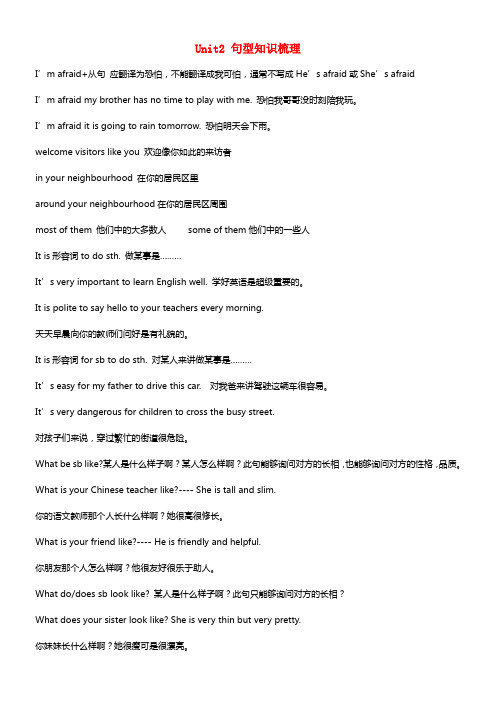
Unit2 句型知识梳理I’m afraid+从句应翻译为恐怕,不能翻译成我可怕,通常不写成He’s afraid或She’s afraidI’m afraid my brother has no time to play with me. 恐怕我哥哥没时刻陪我玩。
I’m afraid it is going to rain tomorrow. 恐怕明天会下雨。
welcome visitors like you 欢迎像你如此的来访者in your neighbourhood 在你的居民区里around your neighbourhood在你的居民区周围most of them 他们中的大多数人some of them他们中的一些人It is形容词to do sth. 做某事是………It’s very important to learn English well. 学好英语是超级重要的。
It is polite to say hello to your teachers every morning.天天早晨向你的教师们问好是有礼貌的。
It is形容词for sb to do sth. 对某人来讲做某事是………It’s easy for my father to drive this car. 对我爸来讲驾驶这辆车很容易。
It’s very dangerous for children to cross the busy street.对孩子们来说,穿过繁忙的街道很危险。
What be sb like?某人是什么样子啊?某人怎么样啊?此句能够询问对方的长相,也能够询问对方的性格,品质。
What is your Chinese teacher like?---- She is tall and slim.你的语文教师那个人长什么样啊?她很高很修长。
What is your friend like?---- He is friendly and helpful.你朋友那个人怎么样啊?他很友好很乐于助人。
牛津译林版英语7B Unit 2 Neighbours重点词组、句型用法+语法复习
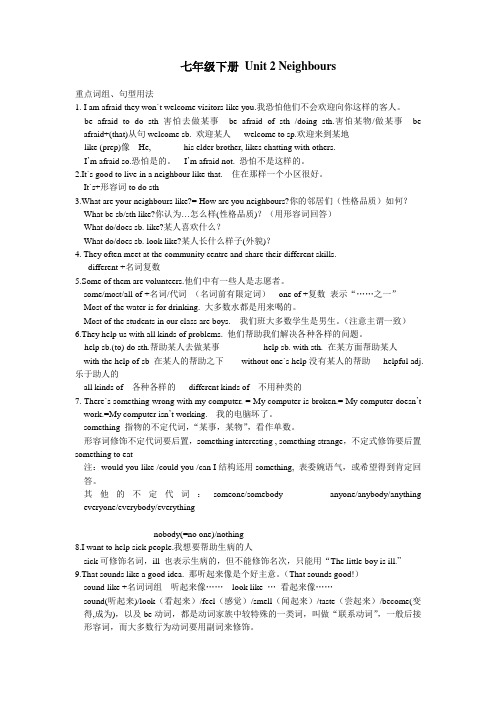
七年级下册Unit 2 Neighbours重点词组、句型用法1. I am afraid they won`t welcome visitors like you.我恐怕他们不会欢迎向你这样的客人。
be afraid to do sth 害怕去做某事be afraid of sth /doing sth.害怕某物/做某事be afraid+(that)从句welcome sb. 欢迎某人welcome to sp.欢迎来到某地like (prep)像He, _______his elder brother, likes chatting with others.I’m afraid so.恐怕是的。
I’m afraid not. 恐怕不是这样的。
2.It`s good to live in a neighbour like that. 住在那样一个小区很好。
It`s+形容词to do sth3.What are your neighbours like?= How are you neighbours?你的邻居们(性格品质)如何?What be sb/sth like?你认为…怎么样(性格品质)?(用形容词回答)What do/does sb. like?某人喜欢什么?What do/does sb. look like?某人长什么样子(外貌)?4. They often meet at the community centre and share their different skills.different +名词复数5.Some of them are volunteers.他们中有一些人是志愿者。
some/most/all of +名词/代词(名词前有限定词)one of +复数表示“……之一”Most of the water is for drinking. 大多数水都是用来喝的。
牛津译林版七年级英语下册Unit 2 Neighbours 重难点知识归纳总结
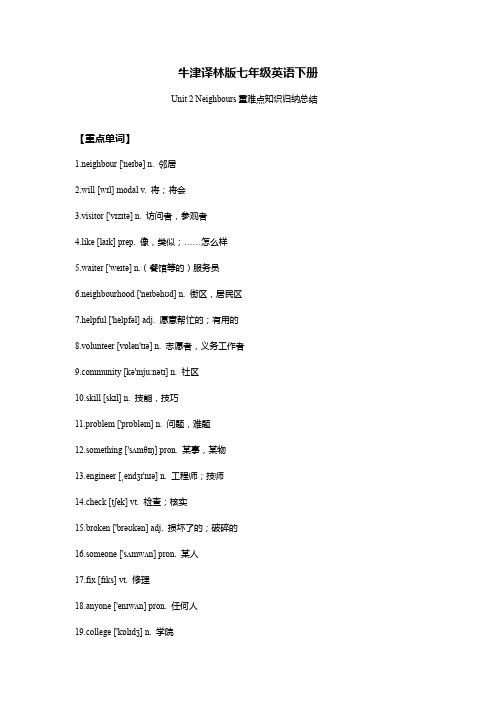
17.on the afternoon of 5 March在三月五号的下午
18.all the day整天
19.know a lot about styles and colours对风格和颜色很了解
20.be happy to give you some ideas很高兴给你一些主意
牛津译林版七年级英语下册
Unit 2 Neighbours重难点知识归纳总结
【重点单词】
1.neighbour ['neɪbə] n.邻居
2.will [wɪl] modal v.将;将会
3.visitor ['vɪzɪtə] n.访问者,参观者
4.like [laɪk] prep.像,类似;……怎么样
【重点句型】
1.I am afraid they won’t welcome visitors like you.
我恐怕他们不会欢迎像你这样的客人。
2.It’s good to live in a neighbourhood like that.
住在那样一个小区很好。
3.What are your neighbours like?
34.artist ['ɑːtɪst] n.艺术家
35.sound [saʊnd] linking v.听起来
36.sick [sɪk] adj.生病的;恶心的
37.notice ['nəʊtɪs] n.布告,通知
rmation [ˌɪnfΒιβλιοθήκη 'meɪʃən] n.信息
39.below [bɪ'ləʊ] adv.下面
5.waiter ['weɪtə] n.(餐馆等的)服务员
七年级英语下册Unit2Neighbours词汇与语法基础训练新版牛津版

Unit 2 Neighbours 知识精讲一、必背词汇neighbour n. <英>邻居 =<美>neighborwill modal v. 将,将会visitor n. 访问者,参观者like prep. 像,类似;……怎么样waiter n. (餐馆等的)服务员neighbourhood n. <英>街区,居民区 =<美>neighborhood helpful adj. 愿意帮忙的;有用的volunteer n. 志愿者,义务工作者community n. 社区skill n. 技能,技巧problem n. 问题,难题something pron. 某事,某物engineer n. 工程师;技师check vt. 检查;核实broken adj. 损坏了的;破碎的someone pron. 某人fix vt. 修理anyone pron. 任何人college n. 学院lucky adj. 幸运的shall v. 将,将会fire n. 火manager n. 经理office n. 办公室policeman n. (pl. policemen)警察postman n. (postmen)邮递员company n. 公司station n. 局,所,站post n. 邮政person n. 人job n. 工作elder adj. 年纪较长的future n. 将来artist n. 艺术家,(尤指)画家sound v. 听起来sick adj. 生病的;恶心的notice n. 布告,通知information n. 信息below adv. 下面better adj. (good/well的比较级)较好,更好anything pron. 任何事design vt 设计,构思group n. 组,群二、重点词汇1. neighbour noun /ˈneɪ.bər/1). someone who lives very close to you邻居例句:Some of the neighbours have complained about the noise from our party.有些邻居已经抱怨过我们的聚会太喧闹。
牛津译林版七下英语unit2neighbours知识点归纳
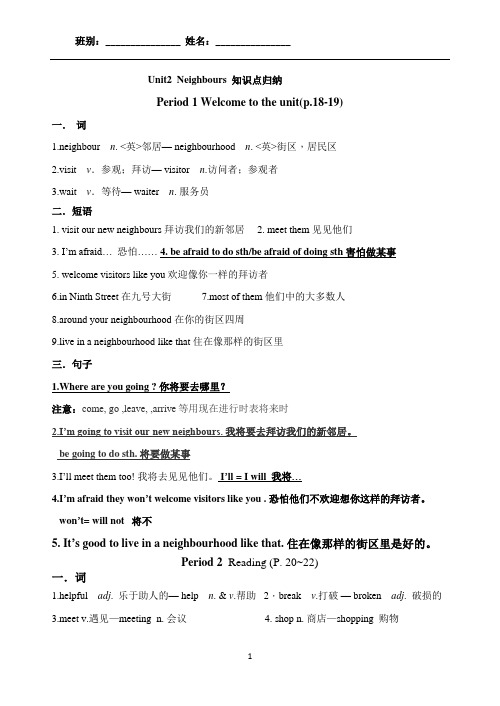
Unit2 Neighbours 知识点归纳Period 1 Welcome to the unit(p.18-19)一.词1.neighbour n. <英>邻居— neighbourhood n. <英>街区,居民区2.visit v.参观;拜访— visitor n.访问者;参观者3.wait v.等待— waiter n. 服务员二.短语1. visit our new neighbours 拜访我们的新邻居2. meet them 见见他们3. I’m afraid… 恐怕……4. be afraid to do sth/be afraid of doing sth 害怕做某事5. welcome visitors like you欢迎像你一样的拜访者6.in Ninth Street 在九号大街7.most of them 他们中的大多数人8.around your neighbourhood 在你的街区四周9.live in a neighbourhood like that 住在像那样的街区里三.句子1.Where are you going ? 你将要去哪里?注意:come, go ,leave, ,arrive等用现在进行时表将来时3.I’ll meet them too! 我将去见见他们。
I’ll = I will 我将…4.I’m afraid they won’t welcome visitors like you . 恐怕他们不欢迎想你这样的拜访者。
won’t= will not 将不5. It’s good to live in a neighbourhood like that. 住在像那样的街区里是好的。
Period 2 Reading (P. 20~22)一.词1.helpful adj. 乐于助人的— help n. & v.帮助 2.break v.打破— broken adj. 破损的3.meet v.遇见—meeting n. 会议 4. shop n. 商店—shopping 购物二.短语1.some of them 他们中的一些人2.meet at the community centre 在社区中心见面3.share their different skills 分享他们的不同技能4. help us with all kinds of problems 帮助我们解决各种的问题help sb. with sth. 帮助某人做某事5.have a “helping hands” meeting 举行“援助之手”见面会6.ask sb. (not) to do 要某人(不要)做某事7.ask someone to fix it 请某人修理它8. some college students 一些大学生9.be ready to help 乐意帮忙 be ready to do sth. 乐意做某事10.really nice 真好 11.help visit the old people 帮助看望老人12.do some shopping for them 为他们购物13.help the old people clean their flats 帮助老人打扫他们的公寓14.help the boy with his homework 帮助这个男孩做家庭作业15.fix things like broken bicycles 修理像坏了的自行车那样的物品16.need help with one’s problem 某人遇到问题需要帮助17.get help with one’s homework 某人作业得到帮助18.among the volunteers 在志愿者中二.句子1. What are your neighbours like? 你的邻居们怎么样? What be …like ? ...怎么样?2. They’re kind and helpful. 他们友好又乐于助人。
七年级英语下册 Unit 2 Neighbours语法专练课件 (新版
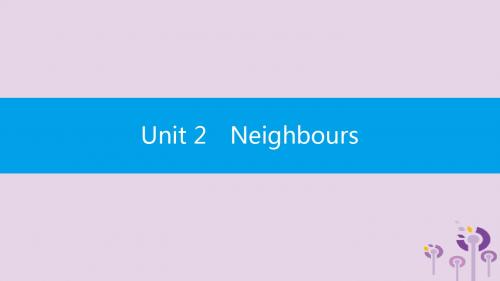
3.注意事项: ( 1 )will除了用于一般将来时中,还可表示意愿、邀请、要求等。例如: I’ll be glad to help you.我很乐意帮助你。 Will you go shopping with me?你愿意和我一起去购物吗? Will you please not talk?请不要讲话好吗? ( 2 )shall用于第一人称I或we作主语的一般疑问句中,还可表示征求对方的意见或提出建议。 例如: Shall we have a rest?我们休息一下好吗? ( 3 )be going to常表示根据迹象判断要发生某事。例如: Look at those black clouds!It’s going to rain.看那些乌云!要下雨了。 ( 4 )there be结构的一般将来时形式:there will be或there be( is/are ) going to be。例如: There is going to be a party this weekend.这个周末将有一次聚会。
Ⅰn English evening class next Sunday.
A.are having B.are going to have
C.will having D.is going to have
( A )2.What time
we meet at the gate tomorrow?
Unit 2 Neighbours
一般将来时 1.概念:一般将来时表示将来发生的动作或存在的状态。常用的时间状语有tomorrow,the day after tomorrow,soon,in a week,next week/month等。 2.构成: ( 1 )肯定句。 ①主语+be( am/is/are )+going to+动词原形+其他。例如: I’m going to attend a meeting next week.我下个星期要参加一个会议。 ②主语+will+动词原形+其他。例如: I’ll go and visit her next Friday.下周五我要去拜访她。 ③主语+shall+动词原形+其他。例如: This time next week I shall be in Scotland.下周的这个时候我就在苏格兰了。 注意:shall 的主语一般为第一人称。
七年级英语下册 Unit 2 Neighbours Grammar 牛津版

Notes
1) be going to 表示将来的打算,有时并 没有特定的将来时间状语。
I am going to be a basketball player. 我想成为一名篮球运动员。 2) what, where, when, how 引导的特殊 疑问句
To recognize and use will, shall and be going to to talk about future
To know the usage of the simple future tense
To learn to use the simple future tense
How are you going to do that? 你打算怎样做?
3) 常见的表示将来的时间状语有: next Monday / Tuesday ... next week / month / year … the coming Sunday / Monday … this afternoon / evening tomorrow the day after tomorrow tonight
A. don't B. didn't
C. won't D. haven't
4. We are glad to hear that the Greens
_____ to a new flat next week.
(2011上海)
A. move
- 1、下载文档前请自行甄别文档内容的完整性,平台不提供额外的编辑、内容补充、找答案等附加服务。
- 2、"仅部分预览"的文档,不可在线预览部分如存在完整性等问题,可反馈申请退款(可完整预览的文档不适用该条件!)。
- 3、如文档侵犯您的权益,请联系客服反馈,我们会尽快为您处理(人工客服工作时间:9:00-18:30)。
Unit 2 Neighbours 知识精讲一、必背词汇neighbour n. <英>邻居 =<美>neighborwill modal v. 将,将会visitor n. 访问者,参观者like prep. 像,类似;……怎么样waiter n. (餐馆等的)服务员neighbourhood n. <英>街区,居民区 =<美>neighborhood helpful adj. 愿意帮忙的;有用的volunteer n. 志愿者,义务工作者community n. 社区skill n. 技能,技巧problem n. 问题,难题something pron. 某事,某物engineer n. 工程师;技师check vt. 检查;核实broken adj. 损坏了的;破碎的someone pron. 某人fix vt. 修理anyone pron. 任何人college n. 学院lucky adj. 幸运的shall v. 将,将会fire n. 火manager n. 经理office n. 办公室policeman n. (pl. policemen)警察postman n. (postmen)邮递员company n. 公司station n. 局,所,站post n. 邮政person n. 人job n. 工作elder adj. 年纪较长的future n. 将来artist n. 艺术家,(尤指)画家sound v. 听起来sick adj. 生病的;恶心的notice n. 布告,通知information n. 信息below adv. 下面better adj. (good/well的比较级)较好,更好anything pron. 任何事design vt 设计,构思group n. 组,群二、重点词汇1. neighbour noun /ˈneɪ.bər/1). someone who lives very close to you邻居例句:Some of the neighbours have complained about the noise from our party.有些邻居已经抱怨过我们的聚会太喧闹。
2). a country that is next to another country邻邦,邻国例句:The relationship between Scotland and its southern neighbour (= England) has not always been peaceful.苏格兰和南方邻邦的关系并非一直很和睦。
2. visitor noun /ˈvɪz.ɪ.tər/1). someone who visits a person or place访问者;参观者;游客例句:You have some visitors to see you. 本,有人来看你了。
2). someone who goes to a website on the internet(网站的)访问者,浏览者3. check verb /tʃek/1). to make certain that something or someone is correct, safe, or suitable by examining it, him, or her quickly检查;核查,核对例句:After I'd finished the exam, I checked my answers for mistakes.我做完考卷后检查答案有没有错误。
2). to mark something with a check给…标记号,打上钩例句:Check (off) each item on the list as you complete it.每完成一个项目就在清单上把该项目钩上。
4. information noun /ˌɪn.fəˈmeɪ.ʃən/facts about a situation, person, event, etc.情报;资料;消息例句:Do you have any information about/on train times?你知道有关火车时刻的信息吗?5. design verb & noun /dɪˈzaɪn/v.1). to make or draw plans for something, for example clothes or buildings设计;制(图)例句:Who designed this building/dress/furniture?谁设计了这座建筑物/这款裙子/这套家具?2). to intend意图,打算例句:These measures are designed to reduce pollution.采取这些措施旨在降低污染。
n.1). a drawing or set of drawings showing how a building or product is to be made and how it will work and look设计图,图纸例句:Have you seen the designs for the new shopping centre?你看过新购物中心的设计图了吗?2). the art of making plans or drawings for something设计(艺术)例句:He's studying design in Paris. 他正在大学学习设计。
3). the way in which something is planned and made设计(方法);设计风格例句:I don't like the design of this sofa. 我不喜欢这把壶的设计。
三、必背短语do some shopping 买东西the day after tomorrow 后天make a fire 生火office worker 办公室职员,上班族police station 警察局post office 邮局worry about 为……担心by train 乘火车by bus 乘公交车by ship 乘轮船help someone with something 帮助某人解决某种困难四、经典句型1. Where are you going?你要到哪儿去?2. I'm afraid they won't welcome visitors like you.恐怕他们不会欢迎像你这样的客人。
3. How many buildings are there in your neighbourhood?你们街区有多少幢建筑?4. There's something wrong with my computer.我的电脑出毛病了。
5. You're lucky to live in a neighbourhood like that, Simon.西蒙,生活在那样的街区你真幸运。
6. That sounds like a good idea.听起来是个好主意。
三点剖析一、考点一般将来时1. 一般将来时的构成形式:sb. will/shall do/ be; sb. be going to do/ be2. 一般将来时用法:1) 一般将来时表示将来某个时间要发生的动作,事情或存在的状态,也表示将来经常或反复发生的动作或事情。
will/shall+动词原形 shall用于第一人称,常被will 所代替。
will 在陈述句中用于各人称,在征求意见时常用于第二人称。
will not=won't shall not=shan't例句:Which paragraph shall I read first? 我应该先念哪一段?2) be going to +do/be 表示将来。
(1) 主语的意图,即将做某事。
例句:What are you going to do tomorrow? 你明天打算干什么?(2) 计划,安排要发生的事。
例:The play is going to be produced next month. 这个剧下个月会编出来。
(3) 已有的迹象表明必将发生的事。
例句:Look at the dark clouds, there is going to be a storm.看那边的乌云,很快要有场暴风雨了。
(4) 现在进行时表将来时下列动词的现在进行时表示将来时:go, come, fly, leave, start, begin, finish, end, arrive …例句:She is leaving for Shanghai tomorrow. 她明天要动身去上海。
3) 一般现在时表将来下列动词come, go, arrive, leave, start, begin, return的一般现在时可以表示将来,主要用来表示在时间上已确定或安排好的事情。
例句:The train leaves at six tomorrow morning. 火车明天上午六点开。
---When does the bus star?---It starts in ten minutes.---汽车什么时候开?---十分钟后。
3. 相关句型1) 一般疑问句:Will+主语+动词原形…? Is/ Are +主语+going to+动词原形…?2) 否定句:主语+won’t +动词原形…主语+am/is/are +not going to +动词原形…二、易错点1. over, on, above1). over通常指“正对……的上方”,表示两个物体之间垂直的相对位置,其反义词是under。
同时,over还可以表示“(大范围内)笼罩,遍及”。
例句:There is a bridge over the river. 那条河上有一座桥。
The woman put her coat over his shoulders. 这个女人把上衣覆盖在他的肩膀上。
2). on指线上或面上的接触点,仅在两个物体互相接触的情况下表示“在……上面”。
例句:There are some books on the desk. 桌子上面有些书。
3). above表示“在……上”时,带有一物在另一物的侧上方的含义,表示地理空间位置,其反义词是below。
